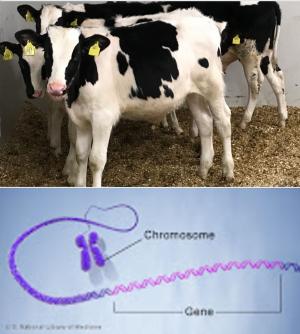Research undertaken between the Agri-Food and Biosciences Institute (AFBI), Teagasc and the University of Missouri has found specific genetic markers related to the immune response in cattle infected with viruses associated with bovine respiratory disease (BRD).

The research has also identified how this information could be used to better select animals which are more resistant to infection. Since the genetic markers in the infected cattle could be detected in blood cells, even when the disease was not apparent clinically, this also raises the possibility of developing a diagnostic test which could identify BRD in cattle before they become sick.
BRD has a major impact on the Agri-Food industry being the main cause of cattle mortality from 1 month to 2 years of age. The economic impact results not only from mortality but also increasingly from morbidity, high treatment costs and ‘hidden’ costs such as weight loss, reduced reproductive performance, low milk yields or carcass blemish and the resultant impact on market price. Mainly considered to be a seasonal problem reaching its peak in autumn and winter it can also be a year-round problem dependent on climate. BRD is the result of a complex interaction of pathogens, predominately viral and bacterial agents.
The initial insult predominately is the result of viral infection, in particular bovine respiratory syncytial virus, bovine herpes virus type 1, bovine parainfluenza-3 virus, bovine coronavirus, and/or bovine viral diarrhoea virus. These viral infections predispose calves to secondary bacterial and further viral infections, which include, Bovine adenovirus-3 or 7, Mannheimia haemolytica, Histophilus somni, Pasteurella multocida, Mycoplasma bovis Streptococcus pnuemoniae, and Mycoplasma dispar.
Susceptibility to secondary infection is partially caused by damage to the epithelium of the airway by viral infection but a major factor is most likely to be the highly immunosuppressive nature of the primary virus infections. Furthermore, over reliance of antibiotics to treat secondary bacterial infections increases the possibility of antibiotic resistant bacteria, which has the potential to be of public health concern.
As noted above, the outcome of the first project has highlighted the possibility of breeding for higher resistance to BRD as well as the development of a diagnostic test for early detection of the disease and also the development of improved vaccine designs.
The second project, which is still ongoing, examines how the respiratory microbiome (bacteria and viruses normally found in the animal’s respiratory tract) changes following initial BRD virus infections leading to secondary infections. These novel research projects will determine how farmers treat BRD in the future, including genetic selection of animals, early testing and reduction of antibiotic usage.
Respiratory diseases cause more deaths in young growing cattle than any other diseases. All respiratory viruses are transmitted by close animal to animal contact through the air. Once infected the animal is more susceptible to secondary bacterial infections which have the potential to seriously impact on animal health and the profitability of the farm. A fundamental appreciation of the animal-pathogen-environment interactions is key to understanding the success or failures of farm control strategies.
The research is being completed in collaboration between AFBI (Professor Louise Cosby), Teagasc (Drs Sinead Waters and Bernadette Earley), the University of Missouri (Professor Jerry Taylor) in the US and the USDA/ARS/US Meat Animal Research Centre in Nebraska (Dr Tara McDaneld). Funding (over $2million) for the work is underpinned by DAERA, DAFM and USDA.
Notes to editors:
AFBI is an arms-length body of DAERA delivering research and development, diagnostic and analytical testing, emergency response capability and expert scientific advice for DAERA and other government departments, public bodies and commercial companies in Northern Ireland, and further afield.
AFBI’s Vision is “Advancing the Local and Global Agri-Food Sectors Through Scientific Excellence”.
AFBI’s core areas:
- Leading improvements in the agri-food industry;
- Protecting animal, plant and human health;
- Enhancing the natural and marine environment.
Latest news
- Resilience, Sustainability and Innovation survey 03 March 2025
- AFBI led Project Launched to Promote Sustainable Dairy Farming across the UK 18 February 2025
- UK Project Launched to Promote Sustainable Dairy Farming 11 February 2025
- International Day of Women and Girls in Science 11 February 2025
